|
Ray Rasmussen
The Writer's Gaze
What the oven is to the baker,
and the berry-stained blouse to the dry cleaner,
so the window is to the poet.
~ Billy Collins |
~ 1 ~
In his poem “Monday,” Billy Collins suggests that poets are window gazers, that inspiration comes from looking out one's window and finding little things that touch the spirit. As examples of things Collins noticed when writing "Monday," he offers:
“. . . a bird grasping a thin branch,
the headlight of a taxi rounding a corner,
those two boys in wool caps angling across the street . . .”
Can Collins mean we writers only gaze through windows for poetic inspiration? No, in the same poem, he glances inward, through the window of his imagination:
“ . . . in every section of the tangerine of earth – the Chinese poets (are) looking up at the moon, the American poets (are) gazing out at the pink and blue ribbons of sunrise . . . .”
And in another poem, “Aimless Love,” Collins’ gaze falls not on things outside his window, but on things inside his writing room:
“ . . . steam rising from my bowl of broth, like smoke from a naval battle . . . .”
In offering a metaphor for the steam, Collins lets us know that his initial inspirations arise from gazing either outside or inside the physical setting. The material collected is followed up by mind’s inward gazings – his associations of one thing with another thing (aka metaphors and similes).
My inspiration in this essay came yesterday, from yet another type of non-window gazing experience. As you may have guessed, I’m fresh off reading a collection of Collins’ poems.
And inspired, I realize I've not yet having looked out my window this morning. I go to the kitchen and notice, outside my window, a white-breasted nuthatch enjoying a meal of grains I've placed for the local flock of feather bundles.
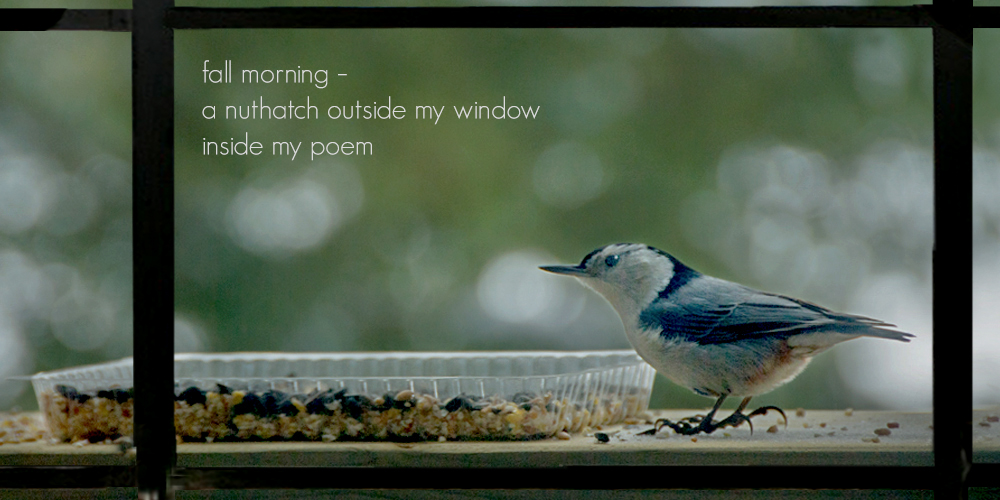
~ 2 ~
Back at my desk and having decided to write about my gazings, I’m neither gazing out a window nor at anything inside my writing room. That is, unless you consider as gazing: staring intently at a computer screen where I’m arranging strings of black letters, marching ants someone called them, while trying to somehow position them in a way that pleases me.
I don’t mean to suggest that I rarely or only reluctantly gaze outside, nor that in doing so, I seldom feel inspired. Just now, a fluttering movement caught my attention in the window behind my computer screen. Butterfly came to mind.
When I glanced over the top of my reading glasses, I saw it was a leaf floating down, an end of life drama, one that started as a tiny bud, then, like a chrysalis opening, blooming to a youthful green leaf, and next turning into a full-fledged dress-up leaf painted in flamboyant reds, yellows and oranges. Just now, I witnessed the leaf's (aka butterfly's) final journey to a resting place on fall's welcoming moist soil.
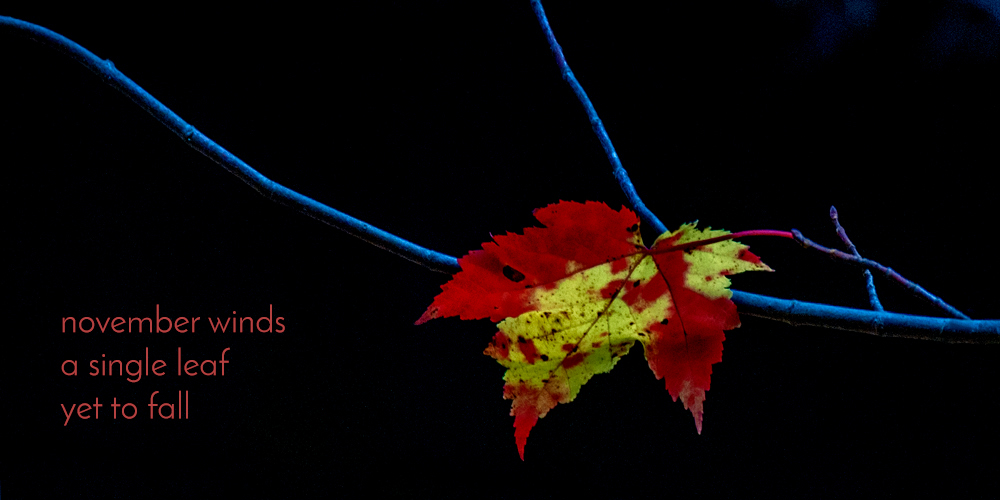
~ 3 ~
Confession time. Please understand, I was raised Catholic. “Bless me Father Collins, for I have sinned. I've not gazed outside my window but once today."
“Tell me more my son,” he suggests, with the Irish brogue of my own parish priest, Father Shannihan, who arrived just now from some deep recess of my mind to provide double authority – himself and Collins teaming up on me.
“Father, I most often stroll past my windows without bothering to look out, and when I do glance out, I usually think “Ho Hum,” rather than “Ah Ha!” Thus I missed a deer that evidently walked through the meadow sometime earlier in the day. At most I'm a glimpser, not a gazer, Father.”
“And how do you know you missed the deer, my son?”
“Because I gazed at his prints in the snow later in the day, while on a dreary walk.”
“Dreary? Do you mean that sometimes you aren’t inspired by the little things, even when outside?”
“Yes, father, I often fail at both window- and outdoors-gazing.”
“I see. Do twelve 'Hail Mary's, light a candle representing your wish for gazer’s eyes, inspiration and a worthy poem.”
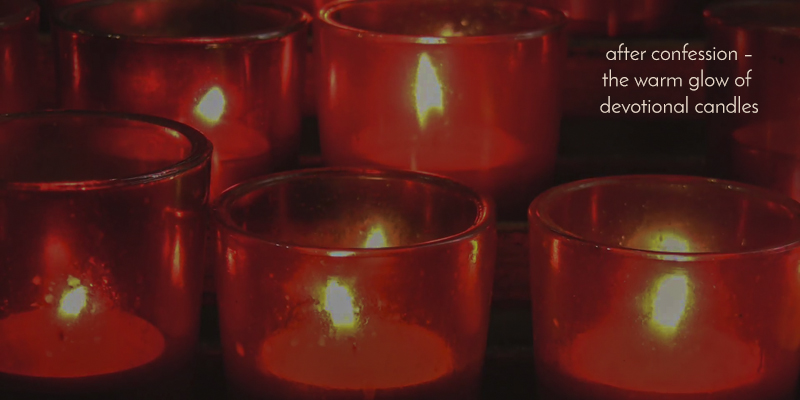
~ 4 ~
Years ago I moved on from Catholicism to a new kind of spiritual practice, not surprisingly, one where guilt and confession also have a place. We haijin are told that to achieve the nirvana of a good haiku, one should not just stare through windows or write from imagination at the desk, but instead take regular ginkos, carrying notebooks and pens, collecting inspirations, just as mushroom hunters carry gathering baskets into the woods.
I gaze up at an image hanging above my desk. It's of Master Basho sitting beneath his banana tree. “Master,” I say, “even on walks I’ve often not been gazing, but instead letting myself be taken completely by the inside nonsense, and thus I’ve trampled over deer, squirrel, fox and even mouse tracks, hardly noticing them.”
“To learn about the pine tree, go to the tree,” he suggests.
“I try, Master. But it’s my walking partner, who seems to be endlessly gazing here and there and exclaiming about this or that little thing, who points things out to me. ‘Hey,’ she said yesterday on our walk, ‘you just stepped right over some porcupine tracks.’”
“Encourage your partner to write haiku. She's taken the first step – letting herself see,” the Master says.
He’s right. When my partner spots a porcupine track, she wears a Madonna-like smile, as if it's an old friend come to visit, despite its back full of quills sticking up like soldiers' spears. Whereas, as she points out, I've simply marched past the opportunity for inspiration. I think Basho would agree.
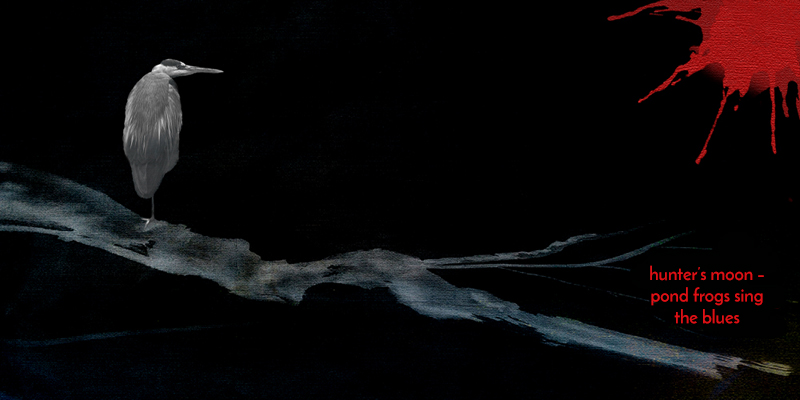
~ 5 ~
Just now, as I sip my tea, I notice its steam rising, think again of Collins’ bowl of steaming broth, and in memory’s mind, I'm gazing again at mist rising from a pond I walked several weeks ago. I see a stalking bird on stilt legs, a poseur playing the sheltering shrub to unsuspecting fish. The heron, frozen in stillness, is gazing intently into the waters, patiently awaiting its prey, which isn’t a haiku, but instead a squirming, silver fish.
Like the heron, I’m gazing at my squirming, slippery thoughts, gathering them in as my prey, and trying to fashion them into a haibun that readers will find nutritional and tasty.
Alas, my marching ants are getting weary. They've been busy harvesting nature’s and memory’s offerings, picking up bits of Collins' writing, and all too often wandering aimlessly.
I’m thinking of a break, perhaps I’ll lay back and listen to a different Billy singing “Blue moon you saw me standing alone …, ” or perhaps I'll just gaze at the ceiling and around the room.
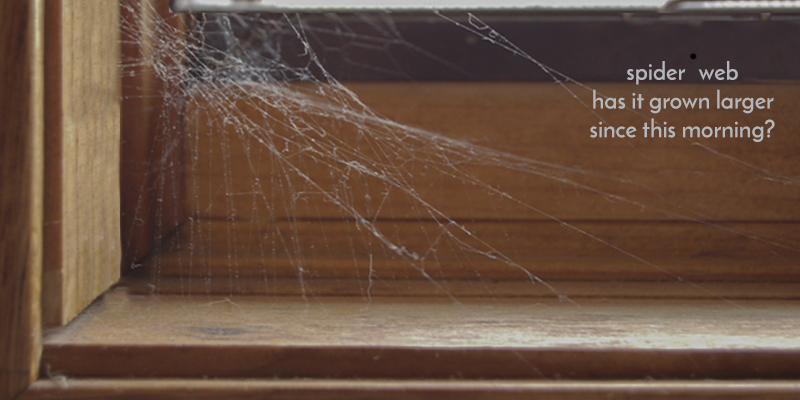
~ end ~
Comments:
In his essay, "Form in Haibun: An Outline,” (Haibun Today 4:4, December 2010), Jeffrey Woodward wrote about the form I've used above. When using Interlaced or Alternating Prose and Verse Elements, the two elements, prose and verse, play the role of chorus and anti-chorus. And I've added another element, images. His thoughts are as follows:
The steady alternation of prose and haiku poses a special difficulty, particularly where the distribution of the two elements is symmetrical, that is, where one paragraph is repeatedly answered by one haiku. Careful consideration must be given, by the author of such a work, to varying sentence structure and prose tempo from paragraph to paragraph. If this task is neglected, a rhythm is soon established like that of the metronome, and the arrival of each subsequent haiku is not only easily predicted by the reader, but also increasingly met with resentment as an unwanted disruption in the narrative or exposition.
Given that I've further broken up the prose narrative by inserting images containing haiku (some might call them "haiga"), there's little doubt that the narrative flow is broken up not just by the haiku contained withing the image, which causes one kind of mental shift, but also by the contrast of image and text forms.
So the piece is offered as food for thought for those of you who like to include multiple haiku/tanka in their work. If so, you may wish to read Woodward's comments.
As another point, this is an ekphrastic haibun essay ... where the practice of ekphrasis refers to one's writing based on another person's art (writing, painting, photography, etc.). I enjoyed Collin's poem, "Monday," which I've linked below for your reading pleasure and wanted to expand on the issue of gazing – where do we writers look for inspiration?
Notes:
William James Collins, known as Billy Collins, (born March 22, 1941) is an American poet, appointed as Poet Laureate of the United States from 2001 to 2003. His publications and literary achievements can be found on Wikipedia: Billy Collins. His book Aimless Love from which I've drawn several passages can be purchased on Amazon.com. His poem "Monday" can be read on the Pan McMillan Website.
Thanks to Kathy Caine, Nancy Hull, Gary Ford, Chris Bullock and Lew Watts for their comments on previous versions of this piece. I apologize to them for not following all of their sage advice. |

